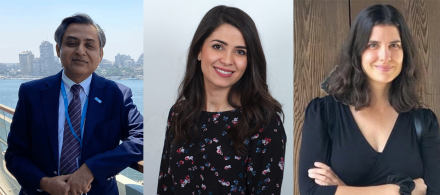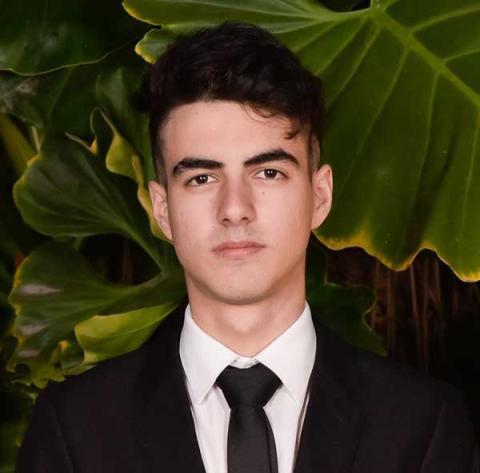
The 2025 UN Emerging Leaders e-Learning experience: Spotlight interviews with World Health Organization personnel
At UNSSC, we believe in the power of partnerships and collaboration to provide the best training experience for our participants. Drawing from our long history of collaboration with the WHO, we are excited to highlight the experiences of three distinguished alumni from the UN Emerging Leaders e-Learning cohort of fall 2025.
Over the course of seven weeks, these participants engaged with leading professionals and subject-matter experts in the field of leadership. This experience helped them refine their leadership and management skills while enabling them to apply the key behaviours outlined in the UN System Leadership Framework.
Arshad Altaf is a medical doctor and physician, with a postgraduate degree in public health. With a long running career in the WHO, he’s currently a Technical Officer for the Research Promotion and Development (RPD) Unit at the WHO Regional Office for the Eastern Mediterranean.
Edwina Zoghbi is the National Officer for Non-Communicable Diseases and Mental Health in the Lebanon WHO country office. She has a background in nutrition and dietetics and also in psychology and psychopathology, a Master's in public health, and is currently doing a PhD in health systems and governance.
Alba Llop-Gironés is a Technical Officer for Nursing and Midwifery and technical lead for data and evidence on health workforce at the WHO Regional Office for Europe with a career background in health policy and system strengthening. She’s a nurse with a specialty in pediatrics, and both a Master’s and PhD in public health.
In this spotlight interview with Juan Pendavis each of the three alumni share their UNSSC learning experience and its impact on their professional journey

Juan: How has the UN Emerging Leaders e-Learning programme supported your professional leadership development?
Arshad: When I first began as acting Technical Officer at the WHO’s Regional Office in Cairo, I faced many external challenges in effectively utilizing my leadership and managing projects. This programme greatly assisted me in navigating these leadership challenges while also helping me identify my strengths and areas for development. My favorite lesson was emotional intelligence. It helped me slow down and realize that when challenges arise in your work, they aren't always directed at you personally; sometimes, it's just a matter of your perception.
Edwina: I have been working at WHO Lebanon for 11 years, where the focus is on versatile, horizontal tasks rather than specialization. While I function as a general practitioner, I recognize I can't be an expert in everything. As I consider my next career move, I see the need to strengthen my management and leadership skills. Although I currently supervise a team, I lack formal training in these areas. This programme presents a valuable opportunity to enhance my understanding of UN leadership.
Alba: Recently, Antonio Gutierrez, the Secretary General, visited the UN City in Copenhagen and emphasized that the principles of the UN Charter, international law, and state territorial integrity are under threat, but they “are not for sale”. In these challenging times, all UN staff recognize the importance of multilateralism for our common future. This programme is essential in developing value-based leadership, which is crucial for promoting human rights, peace and security, poverty reduction, and climate action. Effective leadership training is vital for us to uphold our mandates.
Juan: What was your favorite moment, experience, or memory from the programme?
Arshad: Participating in the breakout rooms and discussing real world leadership scenarios was very helpful. The opportunity to discuss challenges and find solutions was a valuable experience. Big thanks to UNSSC for organizing the breakout rooms and facilitating a diverse and inclusive learning environment. Having participants from locations such as New York, Hungary, Manila, and Kuala Lumpur significantly enhanced the variety of perspectives shared. These discussions were both enjoyable and beneficial.
Edwina: During the last session I was nominated for an award for my insights on the platform by my peers, so it was nice to see myself recognized in the final session and know that I inspired other fellow colleagues to choose me as someone who had an impact on them. Another important moment was reading my 360-degree assessment, because I always thought of myself in a specific way, but after reading what others thought of me, it was very nice to see how these perspectives were organized. It opened my eyes to a lot of things that I didn't know about myself. .
Alba: I really appreciated the opportunity to bring together staff within the UN to foster a shared understanding and vision for our work. It was important to identify the values we uphold and align them with the UN's leadership principles. This aspect of the program was particularly meaningful to me. The programme took place during this critical time for the UN system where cultivating strong leadership and a unified vision in crucial.
Juan: Being part of the WHO, and leading efforts to promote universal health and well-being, how has the UNEL-e programme been relevant to your work?
Arshad: I would say that the programme helped me navigate through many areas found in my work, but especially how to manage upwards better. This was an important learning experience for me. Within the WHO, emotional intelligence and strategic leadership are important, but in a managerial and technical position, managing up is especially relevant.
Edwina: In my work in mental health, we often discuss the importance of self-care and mental health in the workplace. Much of the content I encountered focused specifically on this topic. If I remember correctly, one session was dedicated to understanding and managing oneself, particularly in regulating emotions. As a result, many aspects of the programme were closely linked to my work, making them highly relevant to my leadership role.
Alba: Global health diplomacy, which is rarely covered in medical or nursing schools, is crucial in my work. I often focus on technical details, but effective communication with diverse stakeholders is essential for collaboration. At WHO, we promote health while upholding UN values. The soft skills and leadership training from this programme have been vital in achieving these objectives.
Juan: A message to your fellow peers about the programme?
Arshad: This programme is beneficial for all levels and will enhance your leadership and managerial skills, helping you handle difficult situations. Please consider attending if you can.
Edwina: This programme was a valuable opportunity to connect, share experiences, and engage with the content. We learned about the United Nations and met inspiring leaders who facilitated the programme. I encourage everyone to take part, as the key journey is discovering the type of leader you want to be.
Alba: As a WHO employee, I want to emphasize the need for strong leadership in global health diplomacy. Health is a basic human right, and this programme is crucial, especially as many countries face economic struggles and increasing inequalities. It can help establish strong, value-based leadership needed in the UN system today.
